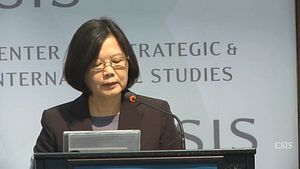Taiwan’s ruling Kuomintang (KMT) has all but selected its candidate for the 2016 presidential elections. Hung Hsiu-chu, the deputy legislative speaker, is the sole contender for the KMT nomination, and was just formally granted the go-ahead by the party’s Central Standing Committee. That sets up a showdown between Hung and Democratic Progressive Party chair Tsai Ing-wen for the presidency – and guarantees Taiwan will have its first-ever female president.
Hung passed of the last hurdles for the nomination on Wednesday, when the Standing Committee formally affirmed her bid. Prior to that, Hung had to prove she had a higher than 30 percent public approval rating, a requirement for the KMT’s candidate. Hung passed that bar easily, gaining 46 percent approval. With those requirements met, Hung will “for sure be appointed” the KMT candidate during the party congress on July 19, KMT spokesman Yang Wei-chung told The Wall Street Journal.
Tsai wants to institutionalize cross-strait relations and make the process more transparent, which in practice will mean slowing down the pace of new agreements. Hung, meanwhile, has previously said that she will make seeking a peace accord with the mainland one of her top priorities – a promise that is sure to spark heated debates during the campaign. Even current President Ma Ying-jeou, seen as very much in favor of expanding cross-strait ties, has tread lightly on the issue of a formal peace accord, shelving a previous promise to pursue such an agreement in the face of opposition.
Hung has also vocally opposed the idea of Taiwanese independence, saying, “This separatist ideology is a threat to Taiwan’s national security.” She accused the DPP of “destroying the peaceful foundation for cross-strait relations,” language typical of her outspoken style (she’s nicknamed “Little Hot Pepper” for that very reason).
Tsai, meanwhile, has carefully avoided being pinned down on concrete issues in cross-strait relations, such as whether she would accept the 1992 Consensus (in which KMT and Chinese Communist Party leaders agreed that Taiwan is part of “one China,” while maintaining different interpretations of what “one China” refers to). The KMT is hoping that Hung’s direct style will force Tsai to pin down her stance on cross-strait issues, potentially alienating either her base or observers already predisposed to worry about cross-strait relations under a DPP administration. However, Hung’s directness could backfire if Taiwanese are in fact, as Tsai has repeatedly said, satisfied with the “status quo” and not eager for a security agreement with China.
Regardless of who wins, Hung’s nomination means the gender of either candidate will not be the deciding factor. During her visit to Washington, D.C. in early June, Tsai was asked at a public panel for her views on what it means to be a woman running for president in Taiwan. Tsai noted that “there are some people in Taiwan that are still rather traditional and they have some hesitation in considering a woman president,” but overall she was optimistic. “I think in general terms, there is a preference for women candidates these days,” Tsai said. “…[A]mong the younger generation, I think they are generally excited about the idea of having a woman leader. They think it is rather trendy.”
Tsai ended by saying that Taiwan’s people face a “serious test” in the elections: “whether we are advanced and civilized enough to accept a woman leader.” With Hung only the formal party vote away from the nomination, it seems Taiwan’s people will have a “woman leader” regardless. “I hope this battle between two women will bring forth a whole new understanding and set an example of true democracy,” Hung told the press.

































